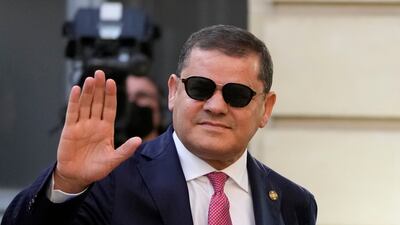Libya’s presidential election process is in disarray after an appeals court disqualified Prime Minister Abdul Hamid Dbeibah from standing as a candidate.
The ruling was not unexpected, as election law requires candidates to stand-down from any official posts, including the post of prime minister, three months before polling day, which is December 24.
Mr Dbeibah ignored the rule, Article 12 in the election law, and submitted his candidacy this month, becoming one of 98 candidates.
The ruling by the Tripoli Appeals Court was announced on Sunday and also records that Mr Dbeibah is standing for election despite pledging, on taking office as prime minister in February, not to do so.
Mr Dbeibah is a wealthy 62-year old businessman from the western town of Misurata who, before becoming prime minister, had no political profile.
He rose to prominence under the regime of dictator Muammar Qaddafi, who appointed him as head of the powerful state-owned construction agency, the Libyan Investment and Development Company (Lidco).
He was chosen as prime minister in February by the UN-sponsored Libyan Political Dialogue Forum, but researchers said in a leaked UN report to the Security Council that there were allegations that at least three participants were bribed during the selection process.
The full UN report into the bribery allegation was not made public.
Mr Dbeibah’s supporters argue for his record of keeping the Government of National Unity, Libya’s first united government since 2014, intact since it took office in March.
His government has managed to sustain a ceasefire in the civil war, signed last October, and Mr Dbeibah has won popularity in recent weeks after announcing several big-spending government programmes.
The court’s rejection of his application widens a divide over the election law. It was issued by parliament last month, but has been rejected by an advisory body, the High Council of State.
Mr Dbeibah has criticised the election law, saying it was designed to favour certain candidates.
“They [parliament] come out with laws designed for personalities, and we cannot be satisfied with this flawed law,” he told a rally in Tripoli this month.
Mr Dbeibah did not immediately comment on the court’s decision and he has the right to appeal against it, in a legal process governed by the time that remains before the election.
Gunmen at Libyan court
Meanwhile, gunmen in the southern town of Sebha continue to bar judges from meeting to consider the appeal of another blocked presidential candidate, Saif Al Islam Qaddafi, son of the late dictator.
His candidacy was struck off by the appeals court because of a conviction for war crimes issued by a Tripoli court. Armed men in jeeps blockaded the Sebha court for a second day on Monday to prevent judges from entering.
The United Nations Support Mission in Libya has condemned the armed blockade of the courthouse, saying in a statement: "The Mission reiterates its call for holding transparent, fair and inclusive elections on 24 December."
The US Embassy in Tripoli later urged rival groups to uphold the rule of law ahead of the vote. “Attacks against judicial or election facilities or judicial or elections personnel are not only criminal acts, punishable under Libyan law, but also undermine Libyan’s right to participate in the political process.”
The Justice Ministry in Tripoli said an armed group had forced everyone to leave the court building. No faction claimed responsibility for the attack.
Last week, the UN Security Council threatened sanctions against anyone obstructing the elections, and also last week the US, France, Germany, Italy and the UK threw their weight behind the election appeals court in a joint statement.









